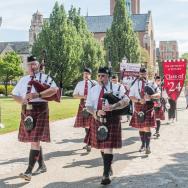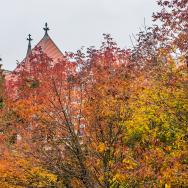Editor’s note: This message was sent Sept. 29 from President Robert J. Zimmer and Provost Ka Yee C. Lee to members of the campus community.
As this academic year begins, we extend a warm welcome to new and returning faculty, students, researchers, lecturers, and staff. This is a time of great challenge as a result of the COVID-19 pandemic, and has required a tremendous amount of preparation from so many in the University to bring us to this moment and allow our safe return to campus. These preparations have called on our colleagues to apply their experiences in novel ways – including thoughtful guidance, intensive planning and coordination from faculty and staff, input from undergraduate and graduate students, and the deep medical expertise of the University of Chicago Medicine. We are grateful for all that has been done so that we can embark upon this academic year.
Members of the University community have worked on issues connected to the pandemic in many ways that go beyond return to campus planning. We want to recognize and thank our colleagues for these efforts as we come back to campus.
Since March, when it became clear the pandemic would require a sustained and comprehensive response, faculty, researchers and staff from around the University stepped to the forefront. Our epidemiologists provided insights to city and state leaders on how the virus behaved and how to halt its spread. At the University of Chicago Medicine, entire floors of the Center for Care and Discovery were readied for the influx of patients. Doctors who had pioneered studies of a helmet-based ventilator showed the world alternative ways to care for patients struggling to breathe, through the use of less invasive and life-saving treatments.
On the other side of campus, at the Urban Education Institute, scholars synthesized relevant research and launched new studies to provide guidance to school districts facing remote learning. At the Booth School of Business, the Kenneth C. Griffin Department of Economics, the Harris School of Public Policy, and the Becker Friedman Institute for Economics, researchers launched dozens of studies to ask and answer questions about the economic implications of the crisis and how policy could be wielded to minimize the damage and restart the economy. Faculty in the School of Social Service Administration and the Division of the Social Sciences explored how solutions could be developed to help improve lives and tend to the welfare of our society, including those most vulnerable to medical and economic upheaval.
The University’s Office of Civic Engagement led an effort in the first months of the pandemic to turn our cafeterias into meal-preparation sites. In partnership with the Greater Chicago Food Depository and local caterers, this work provided 300,000 meals to citizens of the South Side in a time of acute need. In response to the economic stress caused by the pandemic on the South Side, approximately $1.3 million in bridge grants were sent to local small businesses and nonprofits to help support their employees and keep their doors open.
Our colleagues have continued to make progress in many other fields during this difficult time. Scientists from the University and the U.S. Department of Energy’s Argonne National Laboratory in February entangled photons across a 52-mile network, establishing one of the longest land-based quantum networks in the nation. This summer, the Department of Energy came to campus and cited that important work in unveiling a plan to build a national quantum internet. In August, the White House and the Department of Energy announced two of the nation’s five quantum research centers will be based in the Chicago area, one at Argonne and the other at Fermilab. This is due in part to the pioneering work by the University-based Chicago Quantum Exchange and the University’s Pritzker School of Molecular Engineering, the first school in the nation dedicated to the emerging, fast-growing field of molecular engineering, and one of the nation’s leaders in quantum information sciences.
An important sign of the University community’s fundamental strength is our continued success in bringing truly remarkable faculty members to Chicago, and this year we are pleased to welcome an exceptional group of new faculty from around the world, representing many disciplines. They include individuals who have built eminent bodies of work over decades, and younger colleagues whose original contributions show great promise. They will join our impressive new and returning students, postdoctoral researchers, and academic appointees in the University’s critical work of research and education.
Despite the extraordinary work and progress that has been made in dealing with the pandemic on campus, the year ahead will pose vital tests. We are confident that together with the full engagement of all members of the University community, we will meet these challenges. We offer our deep thanks and appreciation for the enormous effort our community has already invested toward addressing COVID-19 and supporting the success of this academic year, and thank you for all the work that is still to come.

